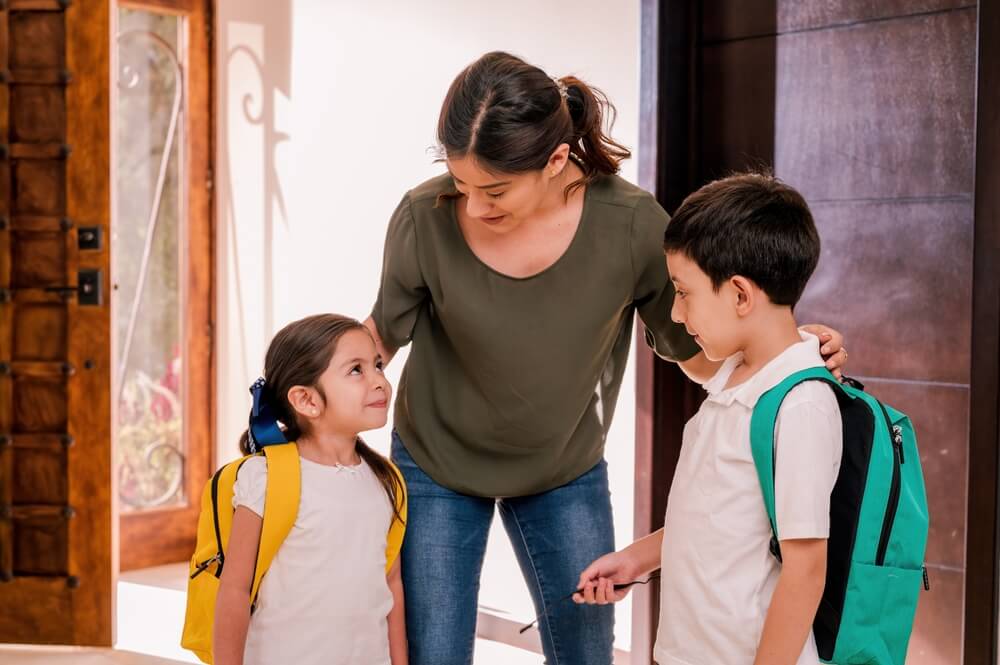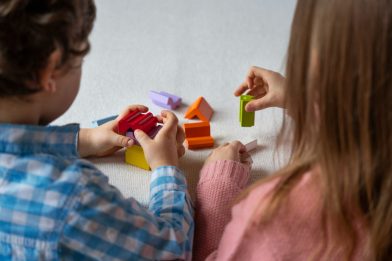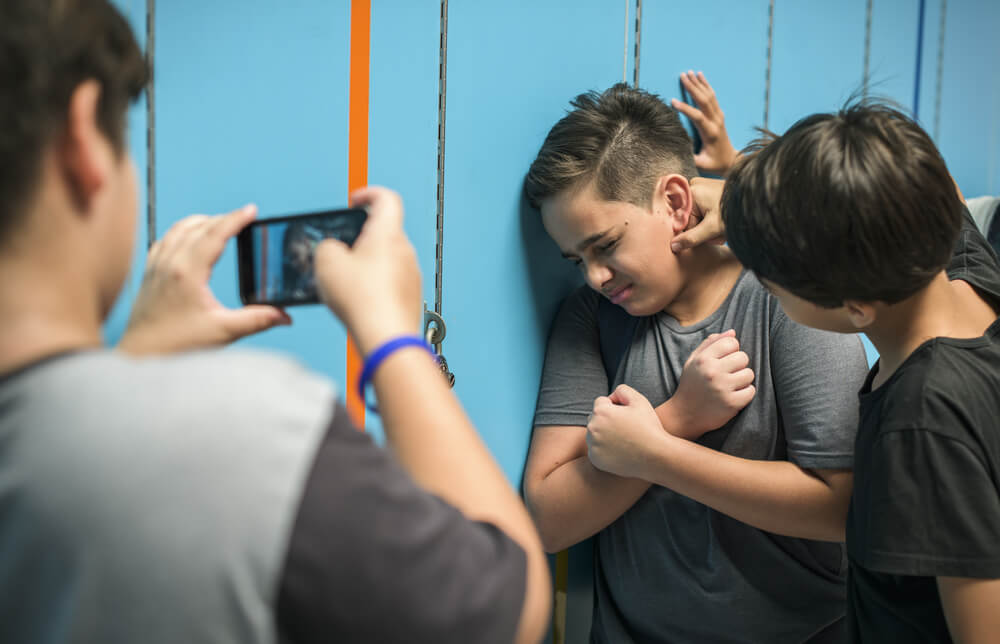A Kid’s Guide on How to Make Friends at School (Plus Tips for Parents!)

Navigating the social landscape of school can be daunting, but mastering how to make new friends at school is a skill that can enrich both academic and personal experiences, fostering connections that last a lifetime.
Making friends isn’t just a nice skill to have. It’s a necessary part of social development and a fundamental life skill. If you’re wondering how to improve your social skills to make friends at a new school—or just how to make friends in general—read on for some proven tips.
Contents:
- Why Is It So Hard to Make New Friends at School?
- How to Make Friends at School: Proven Tips and Tricks
- Making Friends at School: Practical Tips
- For Parents: How to Help Kids Make New Friends
- FAQs
Why Is It So Hard to Make New Friends at School?

Inside Creative House/Shutterstock.com
Let’s start with the obvious: making friends at school is hard! When you understand why it’s so difficult, though, you can start to unravel the mystery of making social connections with your peers.
If you’re struggling to make new friends, the most important thing to remember is that you’re not alone! Almost everyone deals with this problem at one time or another, even kids who appear confident or even popular.
Once you grasp how common the issue is, you’ll start to feel a little bit better about your own predicament.
In fact, this underscores the real reason it’s so hard to make friends in the first place. Kids tend to assume they are the only ones having a hard time forming relationships. This leads them to believe that there’s something wrong with them. Pretty soon, they’ve convinced themselves that no one wants to be their friend at all. This only makes the situation worse as kids begin to withdraw socially and embrace isolation, impacting both mental health and overall well-being.
Coping With Loneliness
Sometimes realizing that other people are dealing with the same problem in terms of making friends at school can be comforting. But other times, it’s not enough. When feelings of loneliness and isolation creep in, things can spiral downward quickly.
Here are some actionable steps you can take to combat these negative emotions when and if they do arise.
Keep a Journal
When you feel like you don’t have anyone to talk to, writing down your feelings can help. In a way, keeping a journal or diary is like having a best friend to confide in. And bonus, you don’t have to worry about them ever telling your secrets!
New to the idea of journaling? Not to worry. There are no rules, which makes keeping a journal or diary one of the simplest things you’ll ever do. Just write down whatever you feel like—whenever you feel like it! It really is that simple, and the effects can be powerful.
Find a Creative Outlet
If you’re feeling lonely, tapping into your creative side can help. Consider sketching, writing poetry, or learning to play an instrument. These hobbies can be great ways to pass the time and even provide an emotional outlet. As an added perk, you may be able to connect with others who share your creative interests when the time is right. Win-win!
Reach Out to Someone You Trust
Of course, even the best journal is no replacement for an actual person you can trust. Talking to someone about your feelings is perhaps the best way to combat loneliness. After all, once you share your feelings, you’re not alone anymore! If your social circle at school is feeling a bit sparse at the moment, consider reaching out to a trusted adult like a parent, teacher, or coach. They may also have some wellness resources that they can offer to help you with building new friendships.
How to Make Friends at School: Proven Tips and Tricks

BearFotos/Shutterstock.com
Despite what you might think, no one is doomed to eat alone at lunch forever. Even the shyest kids can make new friends quickly with a few simple techniques.
Be Open to Making Connections
We’ll start with perhaps the most important trick for making friends at school—being open to new connections. When kids struggle to make new friends, they often feel insecure and close themselves off entirely from connections with their schoolmates.
What does this look like? Imagine the child at school who eats lunch in the back of the room, wearing a hoodie over their head and earbuds in their ears. By protecting themselves from feelings of vulnerability, these kids are inadvertently making the problem worse!
As difficult as it might be, if you want to make friends at school, you have to be open to interacting with others. This means looking approachable. Take your earbuds out, smile, make eye contact, and pay attention to your body language. Maintaining a positive attitude shows openness and can help you naturally influence people in a kind way.
Join Clubs or Sports
New friendships are often born out of shared interests. That’s why joining school clubs or sports teams is a good step towards making new friends. The trick is to find an activity or organization that genuinely interests you. That way, you can meet like-minded people. Pretty soon, you’ll be bonding over your mutual passion for chess, football, music, or whatever it might be!
Participating in social activities outside of the school day provides students with excellent opportunities to form friendships with individuals they may not have class time with.
Make the First Move
We often talk about making the first move when there’s a romantic interest. But this technique is perfect for making new friends as well. So many great friendships go unpursued because neither person is willing to initiate a conversation. Initiating a conversation or connection with a classmate will require some bravery on your part, but it will be worth it in the end.
Our advice? Don’t let your next friendship slip through your fingers due to a lack of confidence. After all, what do you have to lose? Just take a deep breath, walk up, and say hi! The rest will likely fall into place.
Not sure who to approach? Find someone else who looks like they need a friend. This is an act of kindness that often leads to inclusive behavior that makes everyone feel welcome.
Connect on Social Media
Sometimes, social media is perceived as a replacement for real-life connections, but it doesn’t have to be. In fact, many middle and high school kids use social media as a way to extend their friendships outside of class. Instagram, Twitter, and Snapchat are all popular platforms where kids can interact online and grow their relationships (with their parents’ approval, of course).
Some new apps are even designed with the express intent of helping people make new friends. These are similar to dating apps, but they’re not intended to ignite romance. Instead, they facilitate platonic friendships between people with similar interests. Examples include BumbleBFF and Friender.
Read also: A Child’s Fear of School: Everything You Need to Know About Scolionophobia.
Making Friends at School: Practical Tips

SpeedKingz/Shutterstock.com
Like so many other tidbits of advice, suggestions about making friends at school can be easier said than done. That’s why we’re including some practical tips you can apply right away to expand your social circle.
Conversation Starters
Striking up a conversation with a classmate is a great way to spark an instant friendship. But what should you talk about? That can be a difficult question to answer! Here are a few ideas for conversation starters that should move things in the right direction with your new friend.
What Classes Are You Taking?
When starting a conversation with a new friend, start with something you both have in common. This will help you avoid any awkward lulls in the chat that could make one of you want to walk away. Asking about your mate’s class schedule can be a safe bet. This could lead you into a discussion about favorite subjects, dreaded teachers, and anything else you might share related to school.
Do You Have a Pet?
When talking to new potential friends, you don’t have to limit the discussion to school. If you really want to connect, ask about something more personal, like a family pet. This is a particularly useful conversation starter if you have a pet of your own you can talk about.
What Kind of Music Do You Listen To?
Listening to music is one of those universal pastimes that connects us all. In fact, you’d be hard-pressed to find someone who doesn’t like at least one genre of music. This is why topics related to bands, songs, and lyrics make great conversation starters and a great way to find some common ground. If you do decide to use this particular question, be prepared to share your own musical interests, including a few artists and albums you can discuss.
Other Icebreakers: Games and Activities

Studio Romantic/Shutterstock.com
Making conversation is a popular way to make connections with new friends, but it’s not the only way.
New Apps and Games
Whether you’re in middle school or high school, you’re likely surrounded by kids who are glued to their devices. Use this as an opportunity to connect by introducing them to a new favorite game or app. Pick something that’s interesting and easy to learn. Need ideas? Just open the app store on your phone and explore!
Old-School Games
Kids have been making friends for centuries, even without the help of digital devices. Today, pencil and paper games have taken on a renewed charm. For an old-school experience, put the phone away and ask a new friend to play hangman, tic-tac-toe, or connect-the-dots. This is also a great way to bond while developing problem-solving skills, making it more likely to become friends with people.
Jokes and Funny Videos
Countless friendships have been formed over a good laugh. If you want to make a new friend at school, try telling them a joke. Even if the punchline falls flat, you still have a good chance at bonding over the attempt at humor. If you’re too shy to tell a joke yourself, let the Internet tell one for you. There’s no shortage of funny videos and memes online, so find one you think your new friend will like and share away!
Other Useful Tips
- Ask open-ended questions and be prepared to answer them yourself, and have follow-up questions to keep the conversation going.
- Talk first to someone who’s alone.
- Attend social events.
- Join a group conversation.
- Give compliments! That will help you to break the ice.
For Parents: How to Help Kids Make New Friends

SALMONNEGRO-STOCK/Shutterstock.com
Parents whose children experience social anxiety and struggle to make friends at school face a difficult dilemma: to get involved or stand back and hope things resolve themselves. It can be a delicate situation, but it is possible to support your child in the social arena without overstepping.
Be a Good Example
As we get older, friendships can take a backseat to other priorities in life. Parents are wise to model positive relationships and supportive friendships with peers for their children, though. When kids see your social abilities in action, like giving emotional support to your friend group, they’ll naturally pick up on the skills required to navigate their own friendships.
Facilitate Real-Life Meetups
For your kids’ friendships to thrive, they need time and space outside of the school environment. This quality time with their real friends will help create strong friendships that will last over time. Middle schoolers and even high schoolers will need your help to meet up with their friends after school and on the weekends. Offer to drive them to safe places for meetups and be willing to chaperone when necessary.
Do not worry about your child when they go to meet new friends, and do not disturb them with regular calls and texts, asking where they are. Install the Findmykids app—with it, you will see the route and location of the child on the map, you can listen to the sound around them, and get a notification when they are about to go home!
Discuss Your Child’s Friendships
When children begin making new friends, they’ll likely need your help in more ways than one. Make sure they know you’re there to be a sounding board when conflicts arise and to offer advice on making and sustaining friendships. Navigating conflicts in relationships well is an essential skill for kids to learn and develop as they grow.
Give Shy Kids a Nudge
Some kids are naturally gregarious, while others are shy. These are normal personality differences among people in our society. Still, even shy kids need friends and to spend time with people, so resist the urge to shelter children who prefer their own company. Provide a gentle nudge by encouraging your child to invite classmates over to the house where they feel most comfortable. Later, you can progress to visiting their friends’ homes and attending social events at school.
Talk to Teachers and Counselors
Not all kids have the innate social skills necessary to make friends at school, and some students struggle to learn these skills. This is particularly true for children with ADHD and some behavior disorders. If you think your child is struggling socially, you might consider talking to their teachers and/or school counselors. Ask if they’ve noticed any social problems or delays and discuss possible interventions. They may be able to provide some wellness resources to help you navigate this obstacle with your child.
Related: How to Help Your Child Make Friends: Parents Helper by the Ages.
When Friendships Flourish, So Do Kids

Svitlana Bezuhlova/Shutterstock.com
Some people mistake school friendships as frivolous. On the contrary, these relationships mark crucial social milestones in the lives of young people. Having friends boosts self-esteem, supports positive associations with school, and facilitates general well-being. Comment below about your own experiences making friends at school, including triumphs and struggles!
FAQs
What do I do if I have no friends at school?
The best thing to do when you don’t have friends at school is to join social or sports clubs, find common interests with classmates, and start conversations with people. Remember to make eye contact when talking with potential friends, as this will help build strong relationships from the start.
Why do I struggle to make friends at school?
Making friends at school can be difficult. If you are not getting involved in social activities, talking with classmates, or putting yourself out there, then you will have trouble making friends. Those kids who attend online schools have an even harder time making friends.
How do students make friends?
The best way for students to make friends is to join school clubs and sports, attend school dances, and start conversations with classmates. For students who attend online schools, hosting an online study session with classmates can also help them make friends.
How can my 12-year-old make friends?
Getting your child involved in extracurricular activities after school or even in organizations outside of school, such as sports, drama clubs, or volunteer programs, can help them make friends. If you believe your child struggles with social anxiety or has a limitation in making friends, research wellness resources about how to help your child become comfortable in social situations and talking with people.
What is the 11 3 6 friendship rule?
This rule suggests that to keep friendships strong, you should connect with a friend at least once every 11 days, have three meaningful interactions a month, and spend quality time together six times a year. It emphasizes consistency in building new friendships and creating supportive friends.
What is the #2 rule in friendship?
While different sources phrase it differently, many agree that the #2 rule in friendship is showing loyalty and emotional support. Being there for a friend through acts of kindness and a positive attitude is what helps friendships last.
The picture on the front page: stockfour/Shutterstock.com
Проверьте электронный ящик



















